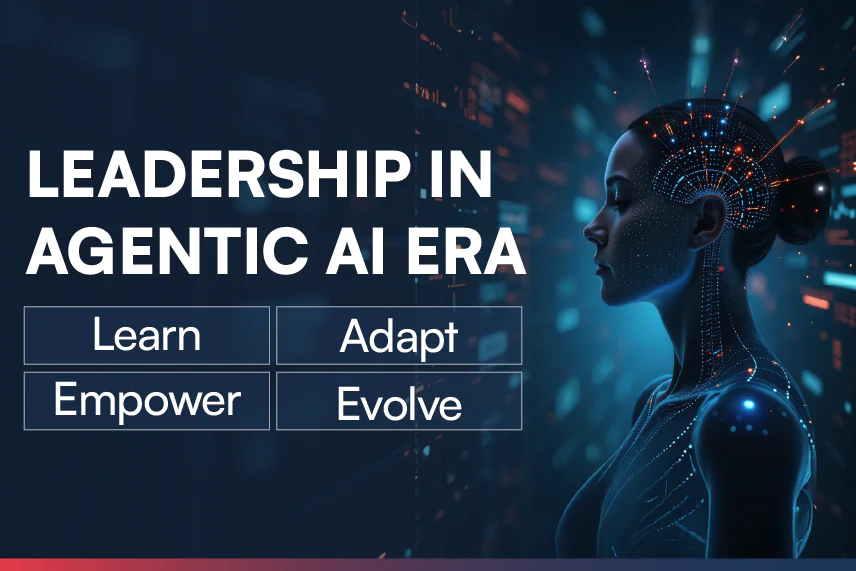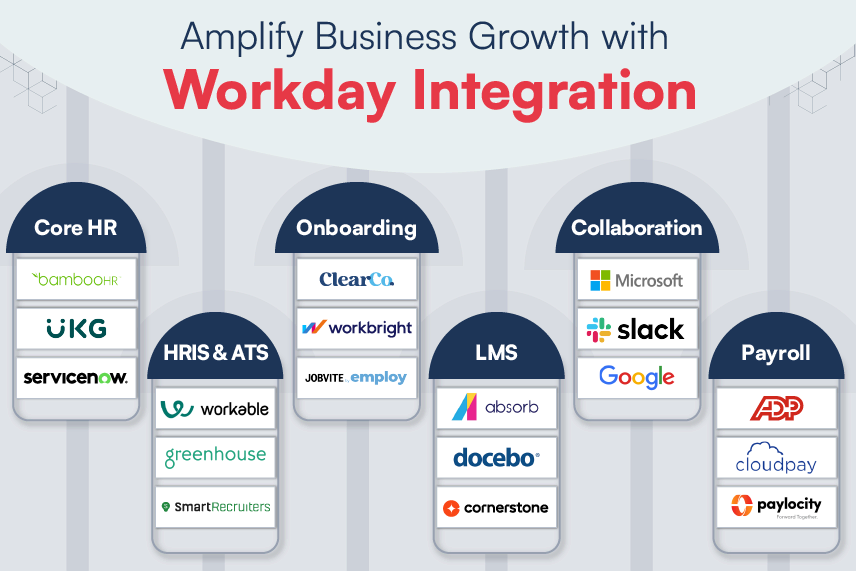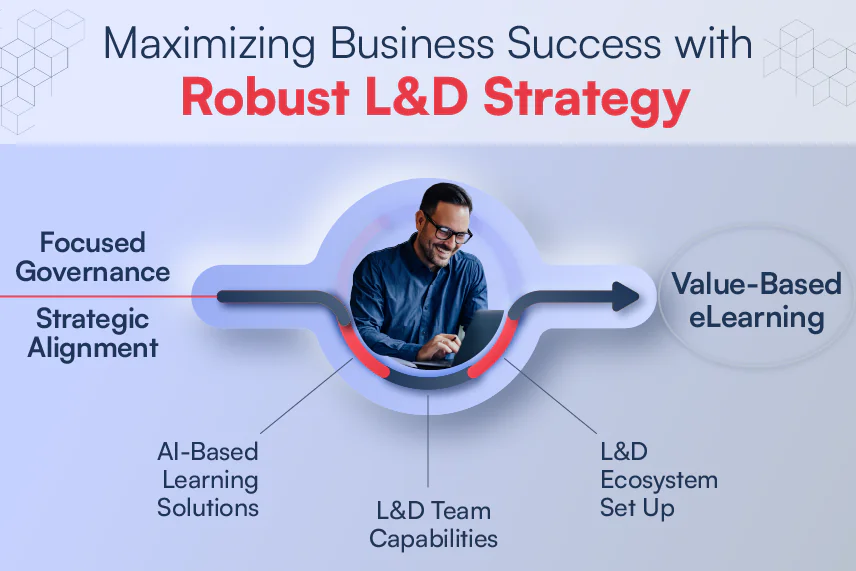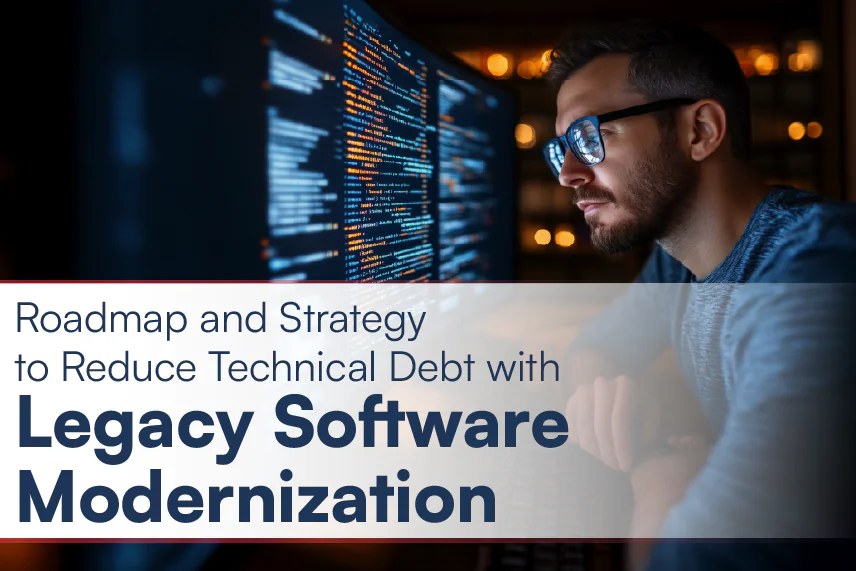
eLearning has gained recognition as a transformative tool for continuous learning and development. Leveraging eLearning for business functions enables organizations to enhance employee performance and drive sustainable growth.
However, organizations often struggle to allocate the right budget to their learning and development initiatives. They perceive them as support functions rather than profit-making business activities.
To delve deeper into this topic, we engaged in an insightful discussion with industry experts to understand their perspectives on eLearning across various business functions. Here’s what we learned about the strategic potential of eLearning for business excellence.
eLearning for Business: A New Era of Continuous Learning
In today’s digital age, eLearning has become a game-changer for acquiring knowledge and skills. To thrive in a dynamic business environment, continuous learning is essential. By embracing eLearning across different business functions, organizations foster a culture of lifelong learning.
According to Allied Market Research, the global eLearning market size is expected to reach a whopping $840.11 billion by 2030 at a CAGR of 17.5% during the forecast period 2021-2030.
Employees at every level have access to tailored online courses, webinars, and virtual training sessions, empowering them to upskill, reskill, and stay updated with industry trends. This enhances organizational productivity and fosters a culture of innovation.
Understanding the Role of eLearning for Business Functions
eLearning seamlessly integrates into each business function, addressing specific challenges and aligning with organizational objectives. Sales teams gain product knowledge and negotiation skills, marketing teams enhance digital capabilities, and customer service teams improve communication and problem-solving.
With eLearning’s flexibility, employees can learn at their own pace without disrupting workflow. It also offers cost advantages by eliminating travel expenses and ensuring scalability. eLearning becomes a viable option for all business functions, regardless of size or budget.
Let’s explore the positive impact of adopting eLearning for different business functions such as sales, marketing, finance, and supply chain.

1. Enabling Customer-Centric eLearning for Sales Professionals
Any successful sales professional needs to adopt a customer-centric approach. eLearning for sales modules can focus on developing skills related to active listening, understanding customer needs, and building strong customer relationships.
By honing these customer-centric skills, sales professionals can tailor their sales pitch and offerings to match the specific requirements of each customer. eLearning also provides insights into buyer personas, customer journey mapping, and effective communication strategies.
This customer-centric approach improves customer satisfaction, increases customer loyalty, and ultimately drives higher sales and ROI.
eLearning platforms offer training on sales process optimization, providing sales professionals with tools and methodologies to streamline their sales activities. Sales teams can learn about sales pipeline management, lead qualification techniques, and effective time management.
eLearning emphasizes the use of customer relationship management systems, enabling sales professionals to efficiently track and manage customer interactions. Companies that embrace eLearning for business can optimize sales processes. They can identify bottlenecks and enhance productivity, leading to increased sales and improved ROI.

2. Driving Marketing ROI and Adapting to Evolving Trends
In marketing, eLearning plays a pivotal role in driving increased ROI. It equips marketers with up-to-date industry knowledge, mastery of digital marketing channels, enhanced analytical skills, and the ability to foster collaboration and continuous optimization.
Investing in eLearning for business functions like marketing can be a decisive move for organizations. eLearning can empower marketing teams and help organizations achieve higher ROI, adapt to evolving trends, and stay ahead in the competitive marketplace.
The rapid evolution of marketing trends necessitates continuous learning. Marketing-specific eLearning courses offer real-time insights into emerging trends, consumer behavior, and technological advancements.
Marketers learn about cutting-edge tools, industry case studies, and successful campaigns, enabling them to apply new strategies and techniques. This continuous learning approach ensures marketers adapt and innovate to improve ROI.
eLearning provides comprehensive training on digital marketing channels like social media, SEO, and content marketing, enabling marketers to leverage these channels effectively. Marketers gain deep insights into strategies, best practices, and nuances of each channel, optimizing campaigns and driving targeted and data-driven marketing efforts.
Embracing eLearning for business equips marketers with the skills to collect, analyze, and derive actionable insights from data. Marketers optimize campaigns, identify trends, and make data-backed decisions for effective resource allocation. This data-driven approach maximizes marketing ROI and helps identify areas for improvement and strategy refinement over time.
Now that you know the importance of eLearning for sales and marketing functions, let’s understand its impact on the financial landscape.

3. Empowering Finance Professionals with Sustainable Growth
eLearning for business has become vital in enhancing finance professionals’ financial analysis and reporting skills. Finance teams can access specialized courses that cover financial statement analysis, forecasting, ratio analysis, and KPIs. eLearning platforms often offer interactive simulations and case studies that allow finance professionals to practice their analytical skills in a risk-free environment.
With advanced financial analysis skills, finance professionals can provide meaningful insights, identify areas for improvement, and make data-driven recommendations to optimize financial performance. This proficiency leads to improved financial reporting accuracy, better financial decision-making, and increased ROI.
Specialized courses on risk management, financial strategy, and investment analysis can help develop a deep understanding of risk management principles and financial strategy. Training nuggets can offer bite-sized learning opportunities to help professionals grasp critical concepts and apply them in real-world scenarios, ensuring strategic financial decision-making.
Finance professionals can identify and evaluate potential risks, implement effective mitigation strategies, and make sound investment decisions. This proactive approach to risk management and financial strategy ensures the organization’s financial stability and fosters long-term growth, ultimately leading to increased ROI.
Introducing eLearning in finance can assist professionals in developing skills related to cost control and financial efficiency. Finance teams can access modules on cost management, budgeting techniques, expense analysis, and process improvement methodologies.
Business professionals can take advantage of eLearning for financial services to gain technical knowledge, analytical skills, compliance expertise, risk management proficiency, and a continuous learning mindset. This can equip them with the skills to drive financial success, contributing to increased ROI and organizational growth.

4. Facilitating Technologically Advanced and Resilient Supply Chains
Implementing eLearning for business can support the development of sustainable and ethical supply chain practices. Supply chain professionals can access modules that cover topics like responsible sourcing, green logistics, circular economy principles, and social responsibility.
eLearning platforms often provide insights into industry best practices, regulatory compliance, and frameworks for sustainable supply chain management. By leveraging eLearning to promote sustainability and ethical practices, businesses can enhance their brand reputation, meet stakeholder expectations, and attract socially conscious customers, thereby driving increased ROI.
The advent of technology has redefined supply chain management. eLearning platforms offer specialized courses on emerging technologies such as blockchain, Internet of Things (IoT), artificial intelligence (AI), and data analytics. Organizations can even accelerate rapid eLearning development using ChatGPT.
By leveraging eLearning for business, supply chain professionals can stay updated on technological advancements. They can drive digital transformation initiatives, improve efficiency, deliver a superior customer experience, and increase ROI.
Supply chain eLearning platforms provide professionals with training modules related to risk management and resilience. Supply chain risk is a significant concern in today’s globalized marketplace, with potential disruptions from natural disasters, geopolitical issues, and supplier failures.
eLearning for supply chain equips professionals with the skills to effectively identify, assess, and mitigate supply chain risks. They can learn about risk assessment methodologies, contingency planning, supplier relationship management, and business continuity strategies.
By proactively managing risks and building resilient supply chains through eLearning, businesses can minimize disruptions, maintain continuity, and safeguard their ROI.

eLearning for Business: Learning Content Audit Solutions
At Harbinger, we are delighted to offer our advanced Learning Content Audit solutions. With our expertise in custom eLearning development, we can assist you in auditing your existing eLearning content across all business functions. We aim to help you enhance and optimize your learning solutions, ultimately driving business growth and empowering your workforce.
Through our comprehensive audit process, we will evaluate your current eLearning content, identifying areas for improvement and providing valuable insights. Our eLearning experts will work closely with you to understand your organization’s specific needs and goals.
We will recommend effective eLearning for business strategies and solutions to enhance your eLearning content, ensuring it aligns with your business objectives. By leveraging our Learning Content Audit solutions, you can expect:
In-Depth Evaluation: We will thoroughly assess your eLearning content, analyzing its effectiveness, relevance, and engagement levels.
Actionable Recommendations: Based on our findings, we will provide detailed recommendations tailored to your business needs. These suggestions will focus on optimizing the learning experience and achieving measurable results.
Customized Solutions: Our team will collaborate with you to execute customized eLearning solutions for business operations, specifically targeting identified gaps or challenges. We will ensure your workforce receives the right eLearning resources to enhance their skills and knowledge.
Business Growth: By improving your eLearning content and empowering your workforce with the correct learning solutions, we aim to drive tangible business growth. Your workforce will have the tools to excel and contribute to the organization’s success.
At Harbinger, we understand the transformative power of eLearning for business and are committed to helping you unlock its full potential. Take advantage of our comprehensive Learning Content Audit solutions today and let us guide you on your journey toward effective eLearning and business excellence.
Harness the Power of eLearning for Business
Creating a culture of learning and development within organizations requires active involvement from both management and employees. While having a CEO or senior leader who values learning is essential, it’s not enough.
Introducing eLearning for business starts by setting expectations that individuals will take time out to learn, acknowledging that learning can sometimes require stepping out of the daily flow of work. This mutual commitment to learning, driven by management and employees, fosters a self-driven approach to acquiring knowledge and skills.
If you want to implement eLearning for business or seek eLearning content development solutions to accelerate learning across different business functions, write to us at contact@harbingergroup.com. Our eLearning experts would be more than happy to help you achieve your business goals.






